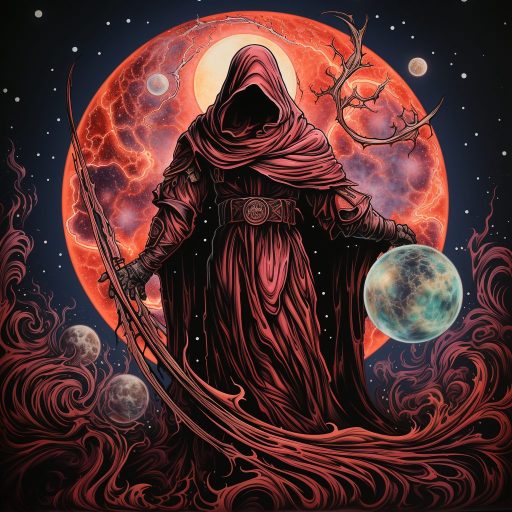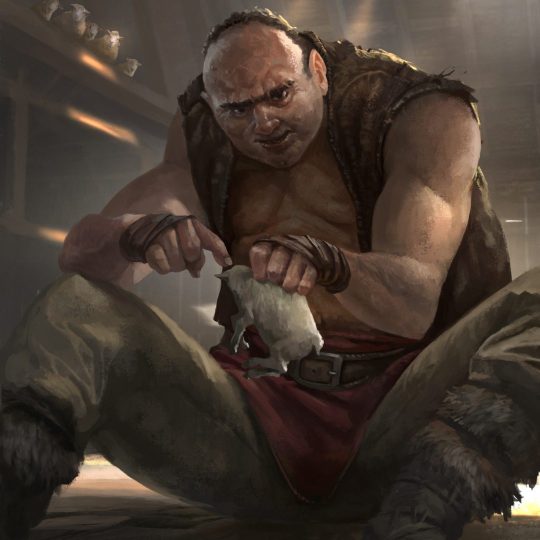
RPG Ideas — Fame
Welcome once again to the weekly newsletter. This week’s topic is fame, which we discussed in our weekly live chat. We hangout every Monday evening at 8 p.m. EST on Nerdarchy Live to talk about D&D, RPGs, gaming, life and whatever nerdy stuff comes up. Speaking of fame fantasy adventurers who take to the streets (or apocalyptic wastelands YMMV) can win fame and fortune in the magical motorcycle racing circuit! You can get Nerdarchy the Newsletter delivered to your inbox each week, along with updates and info on how to game with Nerdarchy plus snag a FREE GIFT by signing up here.
Nerdy News
Go wild for the week that was! Boost your fantasy zoological knowledge, visit the world of Krynn and whip out your wands plus our weekly hangout, a live chat with an industry pro and live game play rounds out this week’s Nerdy News. Check it out here.
Delving Dave’s Dungeon
One of the optional rules in the fifth edition Dungeons & Dragons Dungeon Masters Guide is Renown. found right in chapter one. It’s very similar to fame and could be used if you want a mechanical way to track it in your games. Guildmaster’s Guide to Ravnica expands on the Renown system. There is plenty of information between those sources for mechanics if you want to implement them into your 5E D&D experiences.
You don’t need to get into subsystems or new mechanics to make fame matter in your games. Fame can be used narratively within your stories and games. Let’s look at some ways to use fame that don’t require mechanics.
Four Ways Fame Might Affect Your Player’s Characters
- An adventuring party hears a tale from a bard in a tavern.
- It’s about one of their adventures. As a social encounter the characters have to prove they are the heroes in the tale. The tavern patrons don’t believe them. Perhaps even some of the regulars claim to have met the actual heroes. Are these commoners just telling tall tales to impress their friends or are their actual imposters claiming to have accomplished what the adventuring party have done?
- The adventuring party is sought by two different groups for aid at the same time.
- Both groups are known to the adventurers and in opposition to each other. If the characters choose one group over the other, the group left out will be offended. The two groups might have competing goals or objectives. What will the characters do? Will they choose one group over the other? Will they try to mediate a solution between the two groups? There could even be a third party working behind the scenes to set these two groups against each other. Can the characters ferret out this shadowy third party and expose them?
- Challengers abound.
- Warriors seek to challenge the fighter of the group to duels.
- Famous spell duelists want to challenge the party wizard to a spell duel.
- Strong people show up looking to compete in games of strength against the party’s strongest member.
- If the group has an archer they could find themselves challenged to archery competitions.
- Thieves’ Guilds might flatout threaten the party rogue for entering their territories.
- With fame and fortune comes hangers on.
- The party might find themselves beset with fans.
- Instead of fans they could be recognized as people of means marking them for those looking for wealthy people to rob. Not just muggers and pickpockets — there are con artists out there looking part fools from their gold. Will the characters turn out to be those fools?
From Ted’s Head
Fame! I want to live forever. Fame! This might be from before your time or who knows but it’s the first thing that jumps into my mind when I hear the word fame. When you are talking bout fame or infamy you are looking into how well known is this thing or person. I loved how in the first game of fifth edition Dungeons & Dragons I ran, my players were known as the Heroes of the Town. Outside of Gryphongaff they really weren’t known but there they could use their fame to get certain things done.
Strixhaven: Curriculum of Chaos has a system for building relationship points in 5E D&D but I think it could be rather cool to develop a fame system. I am not gonna do so here but instead plant the seed and see if anything grows. When we start a low level game characters’ sphere of influence and reach is rather small. They can only get places by their own feet or if they are lucky by horse or wagon. As you gain in power, you make connections, grow stronger and have the ability to reach further. By the end of a campaign it is possible to have saved kingdoms and teleported across the world or to other planes of existence. It is even possible to have your name become a household name if you did something so world shatteringly cool or heroic.
With this example a character could gain fame only locally but as you grow in power/level/tier of play, the influence of your fame could grow. Using things like bards, spreading rumors and such you grow your reputation and fame even more. Urban scenes of conflict witnessed firsthand or non-adventurers rescued have the ability to spread it faster.
What about Infamy? If you have a villain who wants to be known for their misdeeds you could have such a thing in your game. Ideally there could be a single score of reputation. A positive score would represent how famous you are and a negative score would reflect the evil you enact in a world. If you want to get more complex you could have different scores in different places, especially if you used to be a bad guy and have turned a new leaf. If you look at the TV series Firefly, Jane thought he had a bad reputation in one place and it turned out he was a hero. In our Nobody’s Heroes campaign, Magpie used to be a villain. As deeds are done and talked about the score can go up or down. I might toy around with the idea of working out a simple to complex system to add into one of our eventual products or maybe make a website post.
I think it might be helpful for myself. During session zero for a game I am currently running I asked the players, “What is a terrible thing on the seas?” After all we are playing a game called We Live on a Boat. They replied with The White Whale. This is an albino Giff pirate. If he is truly a terror of the seas then his very name should invoke fear via his Infamy score. When the adventuring party inevitably encounters him how will they react?
From the Nerditor’s Desk
When I pitched the topic of fame for our weekly live chat and newsletter I’d just started running a new Cypher System science fiction campaign. One of the characters’ focus was Is Idolized by Millions with the idea he’s a famous influencer who broadcasts his exciting exploits on the setting’s Extranet. Since the setting encompasses our own entire solar system we tweaked it so he Is Idolized by Billions instead. (Millions ain’t too impressive when there’s several settled planets and countless colonies out there in space.)
This character’s fame came into play almost immediately during session one. During our session zero the group coalesced around the idea this famous character chartered the pilot character’s ship for a low orbit spacejump to the surface of Earth, a planet long ago stripped of resources and largely abandoned in favor of exciting new planets in the Sol System. We began the campaign with the spacejump about to commence with a live widebeam transmission of the whole event.
These characters were about to garner a lot more fame than they anticipated.
Playing a campaign with famous characters from the outset can be a lot of fun, which we learned pretty quickly in the Cypher System game. Fame can be both a benefit and a drawback and certainly leads to intriguing scenarios either way. Possessing fame means people know about or recognize an individual and this creates leverage. Those who create the atmosphere of fame around a character means they support and advocate them and the things they do, which can make it more complicated for their adversaries.
We’ve explored the concept of fame in a few of our live streamed campaigns as well. In Nerdarchist Ted’s Dungeons & Delving our team’s fame with the audience played a factor in the game. In fact my character, who misunderstood what she was getting herself into when she entered the dungeon crawling competition, quickly glommed onto the idea of garnering fame and this became her primary motivation — a wholly unexpected development for me as a player! In my own Ingest Quest and Ingest Quest 2 campaigns the premise is the whole party are famous culinary adventurers.
Incorporating fame into an RPG campaign creates a whole plethora of new opportunities to explore. Even if the fame dial isn’t cranked up to where it’s a major component of the story it’s always worth considering just how well known characters are on a wide scale or among certain groups or populations. Fame is something we can understand from our own real world and bringing this to our games, with whatever make believe elements they contain, freshens up the RPG experience and creates new ideas to engage players.
*Featured image — We took a break from creating new encounters in our Out of the Box style to develop concepts from Nerdarchist Dave’s Under the Dome campaign. Racing Chances presents guidelines for incorporating arcanotechnological vehicles along with a high-octane race straight from their first session of the campaign along with five teams of racers, two new backgrounds and the vehicles themselves, which are semi-sentient motorcycles. Check it out here!









No Comments